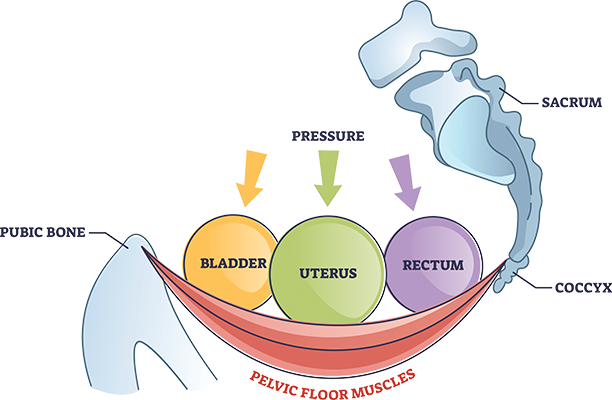The involuntary or unintentional leakage of urine (medical term = urinary incontinence) is a common condition that can affect women of all ages. Symptoms vary in severity and type.
Stress Incontinence:
- Occurs when physical activities such as coughing, sneezing, laughing, or exercising put pressure on the bladder, leading to leakage.
- Commonly results from weakened pelvic floor muscles or damage to the urinary sphincter (the muscle that controls your bladder).
Urge Incontinence:
- Characterised by a sudden, intense urge to urinate followed by involuntary leakage.
- Often caused by overactive bladder muscles or neurological conditions affecting bladder control.
Mixed Incontinence:
- A combination of both stress and urge incontinence symptoms.
Other symptoms are:
- A bulge, or a heavy dragging sensation in the vagina or vulval area or a feeling of something coming down below.
- Pain in your vagina, back or tummy.
- Sexual Intercourse may be painful
- Symptoms worsen after prolonged standing and gets better after lying down.
- Need to pass urine more often or leak urine.
- Need to change position whilst sitting on the toilet or need to use your finger to push back the bulge to allow urine to pass or to open your bowels.
Why Does Incontinence Happen?
The pelvic floor consists of a group of muscles and ligaments that support the pelvic organs, including the bladder, uterus and rectum.
Problems mean that the pelvic floor muscles around the bladder (urethra), vagina and anus do not work properly. The pelvic floor muscle might get weaker because of:
- Having a baby (pregnancy and childbirth can stretch those muscles).
- Lifting heavy stuff over time.
- Getting older or if your body’s muscles aren’t as strong anymore.

Different organs can droop or fall, sometimes it is one organ, but it may be more than one. This could be the uterus, bowel, bladder or the top of the vagina itself. The three most common pelvic floor problems are urinary incontinence (cystocele), anal incontinence (rectocele) and pelvic organ (uterine prolapse).

What Should I Do If I’m Experiencing Urinary Leakage, Or I Am Concerned?
If you are experiencing urinary leakage or feel you have a prolapse, you should not feel embarrassed. It is a common and treatable condition. If you have symptoms, please complete the following complete this short questionnaire.